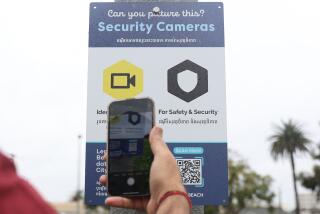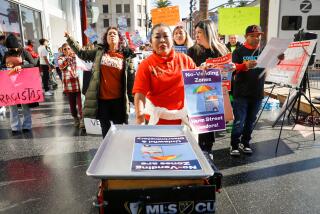Court Upholds Fingerprinting of Outside Solicitors
- Share via
A Superior Court judge has refused to bar Glendale from enforcing an ordinance that requires the fingerprinting of door-to-door canvassers for charities from outside the city.
The Greenpeace environmental organization, with the help of the American Civil Liberties Union, had sought a preliminary injunction against enforcement of the 41-year-old ordinance, claiming that it is unconstitutional.
But Judge Warren H. Deering, in a five-page decision issued Monday, ruled that the fingerprinting does not violate solicitors’ rights.
“Without doubt, a state may protect its citizens from fraudulent solicitation by requiring a stranger in the community . . . to establish his identity and his authority to act for the cause which he purports to represent,” the judge said.
ACLU attorney Dean Hansell said the judge’s ruling means that Glendale residents will be less informed on environmental issues. “The people of Glendale are being deprived of their messages,” Hansell said.
He said Greenpeace members will not submit to the fingerprinting because they fear that police agencies and political opponents would get the prints and other personal data that the city demands and use the information to keep track of canvassers’ political and private activities. The permit applications are kept on file at the City Clerk’s office and are open to the public.
Hansell said the ACLU and Greenpeace are considering an appeal of the ruling and will prepare to go to a full trial with a lawsuit, which was filed earlier this month and seeks a permanent injunction against the ordinance.
Greenpeace USA solicitors generally go door-to-door to hand out information on environmental issues, gather petition signatures and raise funds. The national nonprofit organization has been active in monitoring deep-sea activities of such nations as Russia and Japan, which the group contends kill whales and other endangered species.
The controversy over Glendale’s fingerprinting ordinance started in August, when the city refused to issue a canvassing permit to Greenpeace without the fingerprinting.
Greenpeace claims the ordinance violates constitutional rights of privacy, equal protection and freedom of speech. In his denial of the motion for the temporary injunction, the judge said the plaintiffs had not established a reasonable probability that they would win the case if it went to trial and had not produced any evidence to show that the fingerprinting infringes on the right of privacy.
City Clerk Merle H. Hagemeyer said citizens have a right to know who is knocking at their doors and said the judge’s ruling “confirms that what we are doing is proper.”
Greenpeace officials said they have canvassed 22 other cities in the Los Angles area and have never encountered a fingerprinting requirement.
Glendale’s law was adopted in 1945 to protect residents from World War II-era bogus solicitors claiming to represent charities and veterans’ organizations. It requires that canvassers or solicitors provide affidavits with home addresses and phone numbers, driver’s license numbers, Social Security numbers, birth dates, personal descriptions and photographs, and to submit to fingerprinting.
Only solicitors from charitable organizations with offices outside Glendale are required to submit such information, according to the ordinance. Solicitors for local charities and churches are exempt.
Hagemeyer said the right thumbprint of the solicitor is kept as a public record with the application for the city permit and thus is considered an open public record. Greenpeace officials have said that, even if the prints were kept private, they would still object because its members “feel fingerprinting is degrading and has a strong taint of criminality.”
Charitable solicitors are the only individuals fingerprinted by the city clerk’s office. Fingerprinting for other permits, such as for operating billiard rooms, arcades and taxis, is done by the Glendale Police Department and kept confidential, police officials said. Door-to-door salesmen are not required to have a permit or to submit prints.
The ACLU has another lawsuit pending against the City of Glendale, seeking an injunction to halt the city’s recently implemented drug-testing policy, which the organization charges violates job applicants’ rights to privacy and “personal dignity.”
More to Read
Sign up for Essential California
The most important California stories and recommendations in your inbox every morning.
You may occasionally receive promotional content from the Los Angeles Times.













